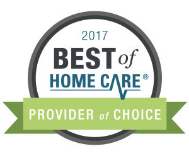Questions About Senior Living
“I’m trying to decide if home care might be right for me. I am 80 years old and live alone. I’m worried that it might be too expensive”………..Mavis in Costa Mesa.
Dear Mavis: People use home care services in many different ways. An in-home caregiver can be a good companion, plus help you cook, clean and do errands. You can start slowly and have a part-time caregiver come to your home a few hours each day or three to four times each week. This will give you a chance to get to know the caregiver and develop a friendship. The charge for caregivers is hourly and the cost is about the same as what you would pay for housekeeping services, although the personal benefits are far greater.
Caregivers are also trained to provide personal care, such as help with bathing, dressing and grooming. You might need such assistance if you become ill or need an operation.
People with greater needs often use live-in caregivers who stay 24 hours a day. This type of home care is commonly used for people with Alzheimer’s disease, Parkinson’s disease, Dementia or MS, people who are home bound from a stroke or accident, and seniors who are frail and prone to falling. The cost for full-time home care is much less than you would expect to pay in a nursing home or assisted living facility.
“I’m going into the hospital for surgery next month. Can home care help me after I return home?”…………Delia in Irvine
Dear Delia: Using in-home care services after a hospital stay is very common. Caregivers can bring you home from the hospital and stay with you round the clock until you are able to be on your own. They can help with personal care as well as light housekeeping, medication reminders and meals.
Home care is commonly used following disabling illnesses, such as strokes, and after serious injuries, such as hip fractures, but it is also used successfully in many other situations. People having cosmetic surgery often use caregivers during the first week or two following the procedure.
While many people plan on using relatives or neighbors to help while they recuperate, this can cause more problems than it solves. Although usually well meaning, relatives may not be prepared to provide the kind of help that you need. It is better to plan ahead before the operation and arrange for in-home care so you can quickly “get back on your feet.”
“I am taking care of my mother all by myself and it’s wearing me out. I hardly have time for anything anymore. Can home care help me?” – Karen in Newport Beach
Dear Karen: Caregivers who try to do it all and do it alone, often run into burnout problems like yours. Research shows that caregivers who remove pleasurable events from their lives to care for their elderly parents are likely to become emotionally exhausted, depressed and even physically ill.
Taking breaks from the tasks of caregiving is a must. It’s important to have time to meet some of your own needs. That is why home care agencies provide a special service for caregivers called “respite care.”
Respite care is part-time companionship for a dependent family member intended to give the primary caregiver some time off. Respite care can be scheduled for as little as a few hours a day or as many as 24 hours. Many people use respite care on weekends, when they need to get away, or for longer when they go on a trip. Others use it on a daily basis. It is easy to start respite care. Just decide on the time and date you want a break, and a caregiver can come to your parent’s home to fill in for you.
If you feel guilty taking breaks from your caregiving, think about it as a benefit for your parents. After taking time to recharge yourself, you are more likely to be loving and patient with their needs. This in turn will help you provide better care.
“My parents are no longer able to drive and need someone to take them to their doctors’ appointments, prepare meals and do some light housekeeping. However, they insist they don’t want someone in their home”.……David in Corona del Mar
Dear David: This is a very common response. Your parents are most likely feeling vulnerable and worried. Not only are they afraid of losing their independence, but also they are realizing that old age is creeping up on them.
Try to encourage them to talk with you about their fears. Reassure them that you will help find a caregiver who is kind, patient, and honest. Start slowly in introducing the caregiver. Explain that the caregiver is only hired to do household chores or grocery shopping. Once the caregiver is in their home, your parents are more likely to see the benefit of having someone around to lend a hand.
If this doesn’t work, seek out the help of a trusted professional. Find someone who your loved ones hold in high regard, explain the situation, and ask them to speak with your parents. Many people are willing to accept the advice of a physician or family friend in the medical field.
When all else fails, consider hiring a Case Manager from a home care agency. These professionals can step in, assess the situation, create a plan of action, and guide your parents into this new way of life. Best of all, Case Managers can provide reassuring support that you are doing what is best for your parents.
“I hired a caregiver for my mother through a local newspaper and agreed to 20 hours of work each week. Now, she comes in late a lot and expects to be paid for 20 hours, even if she doesn’t work that much”………Betty in Costa Mesa
Dear Betty: You are really at risk when you hire someone from the newspaper or from a personal referral. Some problems you might face when employing these people are: (1) the theft of your valuables or money, (2) a potential lawsuit if the caregiver has an accident or hurts themselves while working in your mother’s home, and (3) getting a caregiver who will take advantage of your kindness.
When our agency places a caregiver in your mother’s home, you can rest assured that they are nurturing, responsible and competent. We check all of their references from previous employers and make sure that their Social Security and DMV records are clear. We also do complete criminal background checks on all caregivers.
Our agency carries general and liability insurance, in addition to bonding insurance to protect you against theft and damages to your property. Working with an agency like Caring Companions At Home can help you avoid ill-intentioned or irresponsible caregivers.
“I had never heard of home care until I read your brochure. Are there a lot of seniors who are using it?”……Linda in Costa Mesa
Dear Linda: Home care is more common than most people think. The desire to live at home for as long as possible, and avoid assisted living and nursing homes, explains some of its popularity.
While home care itself is a relatively new service that began in the 90’s, it is now widely used in the United States and in the World and is one of the fastest growing service industries. According to the U.S. 2003 population figures, of people 65 or older, approximately two million employed an in-home caregiver. That’s around 7% of the total population.
We can estimate that a county the size of Orange County has nearly 20,000 seniors over 65 using home care.
Please call us if you have a friend or family member who could use our services.
“My family and I would like to attend my sons graduation but I don’t think I can manage my mother and her wheelchair on the airplane as well as back and forth from the hotel. Does your company provide traveling companions for seniors?”……………………Charles in Huntington Beach
Dear Charles: Using an in-home care service provider is a very good resource for finding a top quality traveling companion/caregiver for your mother. The caregiver can make sure that your mother has a safe and comfortable flight. Once at the hotel, they can help with her unpacking, bathing, dressing, medication reminders as well as personal care.
You and your entire family will be able to enjoy your son’s graduation festivities without a care in the world knowing that your mother will have a traveling caring companion at her side at all times.
While many people plan on using relatives to help with their elders, this can sometimes cause more problems that it solves. For instance, since your mother has a wheelchair the caregiver needs to have the skills to push and transport it appropriately without injuring his or her back. When planning for a trip it is better to call ahead so that we can provide you with a few different people to interview, that way insuring an appropriate caring traveling companion.
“My mother has been caring for my non-ambulatory ailing father for years. She has gotten very worn out and has not seen any of her friends in a very long time. Does your company provide respite care for family member caregivers? “……Susie in Newport Beach
Dear Susie: Using an in-home care service provider is a very good resource for finding a top quality respite care companion/caregiver. Our caregiver can make sure that your father is bathed, groomed, dressed and fed while your mother gets a chance to go shopping or out to lunch with her friends.
If your father likes to go out, our caregiver can transfer him from his bed to his wheelchair and take him for a walk as well as sit and read to him.
The occasion may also arise when your mom has the opportunity to travel out of town, in which case we can provide her with a caregiver that would live-in with your dad while your mom’s able to take a few days off.
“My mother lives in Orange County and I live in the San Francisco bay area. She loves to get all of her holiday shopping done early but this year she’s slowed down quite a bit and really can’t get around on her own. Do you have companion type helpers that could come to her house a couple days a week, for just a week or two, to take her out for a day of Christmas shopping and lunch? Then return home and help her with gift-wrapping? After which she’d probably like help packing them up for shipping and having the gifts taken to either the post office or UPS.”……...Melissa in San Francisco
Dear Melissa: With the holidays right around the corner now is the perfect time to be thinking of finding a nice helper for your mom and we have companions that specifically love to help seniors do their shopping and errands.
We have companions that can either work on a continuous basis or just a few days a week for a week or two. Have your Mom give us a call a few days in advance and we’ll get her scheduled with the same person so they can have fun getting to know one another while doing her holiday shopping.
“I am a pediatrician with my own practice as well as a husband and father. My life is very full. Over this past weekend my family and I visited my parents. Both of them have really slowed down within the past year and they’ve asked me if I could start driving them to their doctor appointments as well as take them out to do their errands. Between my practice during the week and Cub Scouts, soccer and baseball games on the weekends I have no time and between balancing the activities of three boys under the age of ten, my wife has little or no extra time to take on the activities of two more people. My question to you is; do you have companions that can step in and do these types of things for people like my parents?”……Bruce in Newport Coast
Dear Bruce: Absolutely. Whether your parents are completely ambulatory or use canes or walkers, we have very nice companions that love to spend time with seniors taking them to their appointments and doing their errands and grocery shopping. Usually, after all of the driving around has been done, the caregiver ends up filling and/or picking up prescriptions, putting away groceries and then fixing them a little snack or meal. These types of situations end up developing into a nice little friendship between the seniors and the companions. Ideally we like to find a companion that lives nearby so, that if the occasion arises that they need someone to come over at an unscheduled time, the companion can pop right over to help them with what ever they might need.
“Happy New Year! After spending the holidays with my parents it’s become clear to me that they can’t really maintain their home and take care of each other without a lot of help. My Dad has arthritis in his hands and my Mom has macular degeneration. Do you know if it’s possible to have caregivers that are an actual couple who could live-in with my parents so that the man could help my Dad and the woman could help my Mom? They have an apartment over the garage as well as a second master suite”…………………..Shannon in Newport Coast
Dear Shannon: To answer your question, yes, we have couples that live-in with couples and it works out really well. This is how it would work with your parents if they felt so inclined to have a couple live-in.
The man could assist your Dad with his personal needs as well as help him with his hobbies, projects around the house, gardening, etc. The woman could help your Mom with her personal needs as well as assist her in the kitchen with meal preparation, housekeeping, laundry, changing the linens, grocery shopping, etc.
If your parents like to travel the caregivers could prove to be very nice traveling companions and provide constant care and guidance while your parents were out of town, plus giving you and your family a piece of mind knowing that your parents were safely in the good hands of their caregivers. For further information please feel free to contact us at any time.
“My parents have been retired for 30 years and had planned on selling their home and moving into an assisted living environment. Now that we are in a national real estate crisis they are forced to change theirs plans, so staying in their home is their only option. My parents are in good health but are having difficulty with their routine activities of daily living. Due to the state of the economy and the rate of unemployment, are there any more working caregivers?”……..Susan in Costa Mesa
Dear Susan: We will not be losing in-home caregivers any time soon. The need for caregivers and companions is expected to rise over the next 10 years by 40%. As people grow older, people with disabilities are living longer and Discharge Planners and Care Managers are advocating to keep their clients and patients out of institutions and staying at home.
We have part-time, full-time and live-in caregivers available 24/7. They can help with bathing & dressing, meal preparation, transportation, personal care, gardening, light housekeeping, laundry, exercise, shopping & errands as well as physical therapy. Please feel free to contact us for a free in-home assessment by one of our friendly and knowledgeable Case Managers.
“Our whole family will be getting together for a special occasion and my brother and I want to talk to our Mom about home care. She is 78 and lives alone. We think she could use some help and are also afraid she is getting lonely. We are not sure how to approach the subject. Any advice?” … Rick in Huntington Beach
Dear Rick: Your Mom is lucky to have such attentive children!
If your mom has not expressed a need for help herself, that’s a good sign that she values her independence. We founded Caring Companions at Home in order to give seniors the option of living independently in their homes as long as they like.
The easiest solution is simply to ask. Frame the question in a way that emphasizes that you are asking out of love and concern for her. You might begin with: “We are so impressed with how you have been doing living on your own, and we want to be sure that you are happy, and remain healthy and active as long as possible. Could you use any help?”
If she is open to a conversation about more long-term planning, you can explain that home care is a good alternative to having to move to an assisted living facility down the road. Maybe now would be a good time to “try home care on for size”.
She can try it out on a part-time basis, maybe just a few hours one or two days a week. Try to find out if she would like help with any specific activities, such as holiday shopping, taking up a new hobby, or organizing a closet at home.
“My mother is over 70 and has fallen twice over the past year while out shopping. Luckily she did not hurt herself, but she is now reluctant to go out on her own. I think she should use a walker or a cane, but she disagrees. What do you think?”……….Theresa in Mission Viejo
Dear Theresa: I think it is good that you are thinking creatively about ways your mother can maintain her independence and mobility.
Your mother’s reluctance to go out is likely due to a combination of factors, including an understandable fear of falling again. An evaluation by her doctor is the best way to find out how much of her reluctance is due to anxiety or whether she is facing real trouble walking and keeping her balance. Her doctor is also best placed to make a recommendation on what ambulatory aid, such as a walker or cane, she may need.
You might also consider part-time, professional home care. Home care companions are experienced in assisting seniors with walking or getting up and down stairs. They also can help them get in and out of a bed, bath, car -- or shopping mall! Home care companions are also familiar with the correct use of walkers, canes and wheel chairs.
There’s an intangible benefit: having a companion when leaving the house can give your mother the confidence of knowing someone is there to help prevent another fall. Hopefully she will be back to shopping very soon.
“We’re trying to talk to dad about his long-term care needs, but he always changes the subject. Is this common?” …… Dennis in Newport Beach
Dear Dennis: Yes. In fact, a recent “Aging in Place in America,” survey found that seniors rated loss of independence and moving out of their home as their greatest fears.
Most seniors want to age in place. That’s why they don’t want to discuss the alternatives. The good news is that, with a little help, they often can stay in their home.
Caregiver services like Caring Companions At Home offer everything from companionship to personal care. On staff are Certified Nursing Assistants (CNAs) and Home Health Aides.
Call us and we’ll schedule to have one of our case managers meet with your dad. Chances are we can give you and your dad peace of mind.























